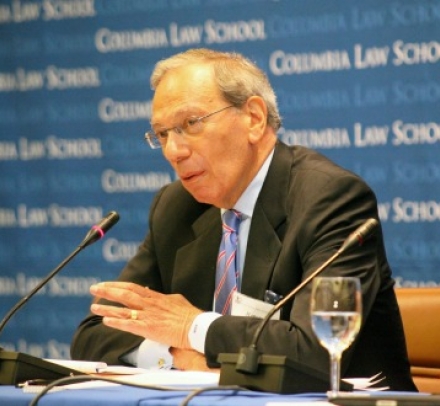Retired Bankruptcy Court Judge Robert D. Drain ’84 Delivers Second Annual Harvey R. Miller ’59 Lecture
The judge praised Miller’s creativity in achieving restructuring outcomes.
Not only does the bankruptcy code permit creativity in crafting restructuring settlements, but the best resolutions often demand it, longtime bankruptcy judge Robert D. Drain ’84 told an audience of Columbia Law School alumni, students, faculty, and staff at the 2023 Harvey R. Miller ’59 Lecture in September. The annual lecture is sponsored by Weil, Gotshal & Manges, where Miller was a partner, to honor the Columbia Law alumnus and teacher, who died in 2015.
Miller’s Legacy
Drain, who spent more than 20 years serving on the U.S. Bankruptcy Court for the Southern District of New York and presided over many high-profile restructuring cases, praised Miller, a pioneer who is widely credited with developing the modern practice of bankruptcy law, for being both creative and flexible.
Miller first gained national recognition beyond those practicing bankruptcy law for his work on the Texaco bankruptcy in 1987 and went on to work on some of the largest collapses in corporate America. During the 2008 financial crisis, he orchestrated the reorganization of General Motors and the speedy sale of parts of Lehman Brothers to Barclays.
“He represented scores of major corporations in their financial distress, mostly leading to reorganizations, either through a plan or sale, to maximization of value, even if it was not a reorganization, and the preservation of jobs,” Drain said. “This just wasn’t done in anything approaching that scale before his arrival on the legal scene.”
A ‘Creative’ Approach to Bankruptcy
During his time on the court, Drain was popular among attorneys who liked to bring complicated Chapter 11 cases before him; he was known for having an almost encyclopedic knowledge of precedential bankruptcy law. He presided over one of the busiest bankruptcy courts in the country for megacases involving $100 million or more in assets. Drain retired from the court in 2022. He is now of counsel at Skadden, Arps, Slate, Meagher & Flom in the corporate restructuring group.
In his lecture, Drain said he favors flexibility and experimentation in reaching bankruptcy settlements. The challenge for current bankruptcy law practitioners is to know the limits of such an approach, Drain said. “How does one best avoid not overstepping the boundaries of that flexibility? How does one know when he is being too creative, or attempting to be too creative, in administering the bankruptcy code?”
If a proposed settlement fulfills “basic principles” such as the fair treatment of different types of claims, maximization of value, and preservation of jobs, “the parties and ultimately the courts can find authority to resolve financial distress by viewing the code as a flexible instrument,” he said.
Drain contrasted that flexibility with an approach he described as a “regulatory view” of bankruptcy, where “if the code doesn't spell out a specific solution according to whoever is expressing that opinion, that’s the end of the story.”
Serving the People
Toward the end of his lecture, Drain discussed the Purdue Pharma bankruptcy case, which he presided over. The bankruptcy plan is now before the U.S. Supreme Court, which has placed it on hold while it reviews a challenge to its legality. The U.S. Department of Justice, through the U.S. Trustee, appealed a decision upholding the settlement by a federal appeals court. Drain expressed frustration that the appeals have delayed payments to states and individuals who suffered from the opioid crisis. “It’s another year of no money going to people where the money really could be useful,” he said. “One-hundred-thousand people die a year of overdoses. That money could have gone out months ago, and it won’t for another year—if it goes out at all.”
Bankruptcy judges “care deeply about getting the right answer, within the constraints of the law,” Drain said. “They see the place and the value of preserving companies. But … they also deal with real people every day, in and out. … They see people who are truly in financial distress,” Drain said. “If you ask any bankruptcy judge around the country the question, they will say they serve the people.
“Harvey [Miller] actually understood this, too,” Drain added. “So I urge you, as best you can, to emulate him.”
